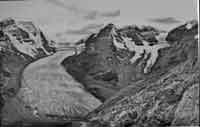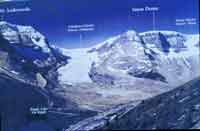
Introduction
Publications
Climate Change
Industrial Impacts
Agricultural Impacts
Urban Impacts
Biodiversity Loss
Definitions
Links
Site Map
|
 |

A Few Impacts of Climate Change
(Page 1 of 8)
The impacts of climate change are huge, and will become more apparent in the future. In Alberta, precipitation is expected to decrease, evaporation will increase, the effect of UV light and acid rain will increase, and cold water fish such as trout may lose portions of their habitat. Soil moisture in Alberta will decrease, droughts will become more frequent, and river flows will decrease. Indeed, many of these trends can already be seen.
This introduction to the impacts of climate change consists of the following pages:
- Glaciers
- Temperatures in Alberta
- Higher temperatures mean greater evaporation
- Reduced summer river flows
- Lower flows mean longer water renewal times
- The impact on Dissolved Organic Carbon (DOC)
- What are the predictions?
- What does the past climate tell us?
Glaciers
This is Athabasca Glacier in the Columbia Icefields of Banff National Park. The picture on the left was taken in 1917, while the one on the right was taken quite recently. This glacier loses 16,000,000 cubic metres of ice each year. Agriculture in southern Alberta depends largely on irrigation, and glaciers help by holding snowfall and slowly releasing it during summer months. When the glaciers disappear, river flows will be higher in the spring, but lower in later summer. This could have a significant impact on irrigation in southern Alberta. The ecology of the rivers will also be greatly affected.


|
| The Athabasca Glacier, in 1917 (left), and ~2000 (right) |
Next Page
Back to Main Climate Page
|  |







